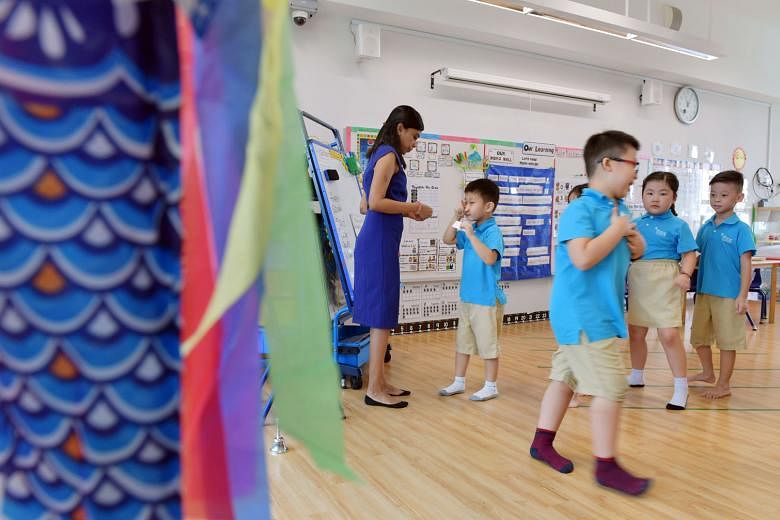Education in Singapore is not just a national value but an obsession, so there is nothing surprising when it features prominently in the annual National Day Rally (NDR), the most important political speech of the year.
This year is no exception and the plans laid out by Prime Minister Lee Hsien Loong for early childhood education are both welcome news for the sector and a signal that the country intends to take a dramatic step forward in terms of access to pre-school education.
One thing is very clear: State involvement in the sector is expanding. This can be seen from the doubling of the state budget for early education by 2022, the addition of tens of thousands of places for children zero to four years of age in new centres, and the creation of centralised and standardised teacher training at a new national institute.
Greater state involvement in this fragmented sector is welcome. Unlike in secondary and tertiary education where Singapore is a global leader, it has ranked low internationally on early childhood education, as the 2012 Lien Foundation report, Starting Well, noted.
The recently announced changes have the potential to move the country closer to the top. Excellence there is characterised by, among other factors, near universal coverage for three- to five- year-olds, affordability and/or subsidies for low- and middle-income families, specific teacher qualification standards, and good teacher wages.
The stakes for Singapore are high and getting pre-school right will help with some of the country's longer-term challenges.
First, as the Prime Minister signalled in his speech, ensuring access to quality early education is a strategic move aimed at ensuring social mobility.

Not only is social mobility (via meritocracy) part of Singapore's national identity but it is also linked to making full use of the country's human capital. However, as Deputy Prime Minister Tharman Shanmugaratnam noted earlier this year, as social gaps widen, social mobility is in trouble in Singapore. Education has an important role to play in reversing this trend.
Children who enter primary school at a disadvantage find it hard to catch up and disadvantage is often a function of social exclusion. Over time, the achievement gap is likely to grow and high-quality early intervention is one way to tackle the problem.
The focus on creating additional places for children zero to four years old is especially important. As much of the neuroscience and child development literature shows, much of brain development occurs between birth and three years old and having a stimulating, language-rich environment has lasting benefits. Not only can childcare centres with well-trained professionals provide such an environment but also, crucially, teachers can work with parents on techniques to help develop children's language abilities and curiosity at home.
The creation of a new national institute to train people for the early childhood sector is an important move to strengthen the quality and standards of teachers.
Especially gratifying is the announcement that specialised tracks to prepare pre-school teachers in the arts and music will be available. A focus on and widespread availability of the arts in the early years should be seen as another strategic element in meeting the country's long-term goals. The need to develop learners and a work force who are creative and critical thinkers, not just good test takers, is part of Singapore's approach to maintaining a competitive edge in the global market.
This need underlies a number of recent policy decisions, such as heavy investment in lifelong learning or the creation of new tertiary institutions like the Singapore University of Technology and Design or Yale-NUS College, the undergraduate liberal arts tie-up between Yale University and the National University of Singapore.
Education in the earliest years also has an important role to play in this strategy. Arts education not only helps children express their creativity and value it but it also promotes what psychologists call "divergent thinking", which encourages problem-solving through multiple methods by generating many ideas.
The creative arts also help children develop their soft skills by encouraging them to explore their emotions and develop self-regulation and self-control.
A third challenge that these changes in the early childhood sector may address is Singapore's declining fertility. At the NDR, the Prime Minister teased the audience, saying that the Government was doing its part and now it is up to young couples to have babies. The strong kernel of truth in that joke is that there is a clear, positive relationship between the availability of affordable, high-quality day care and fertility.
Numerous studies from Europe show that the transition to motherhood is hastened by public and labour market policy measures that allow women to combine work and family life. Good, reasonably priced pre-school and childcare is not the only one but it is a crucial part of the puzzle.
The new measures for the early childhood sector have potentially far-reaching implications for Singapore. The challenge will come in the implementation. Unlike the high-tax, welfare state regimes in Scandinavia or France whose pre-school systems top the global rankings, Singapore will continue to depend on significant private-sector involvement even as the provision by the state sector grows.
A major task ahead for policymakers is to incentivise providers to keep fees at a manageable level for both low- and middle-income families. Costs will inevitably rise, especially for teachers' salaries, which is necessary to attract and retain high-quality professionals who will staff the new centres. Squaring the financing circle will entail costs - especially in terms of consolidation in the sector - but the benefits will pay dividends for years to come.
- Trisha Craig is Dean of International and Professional Experience at Yale-NUS College.

